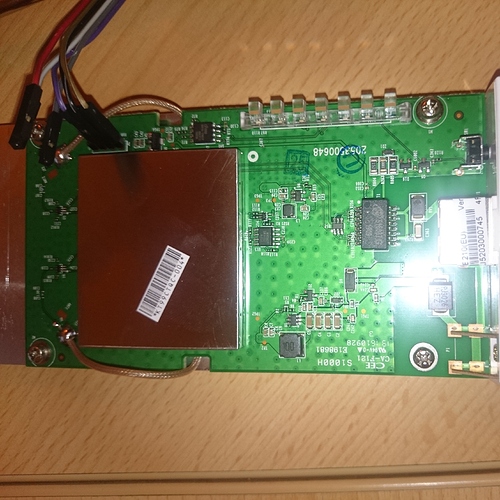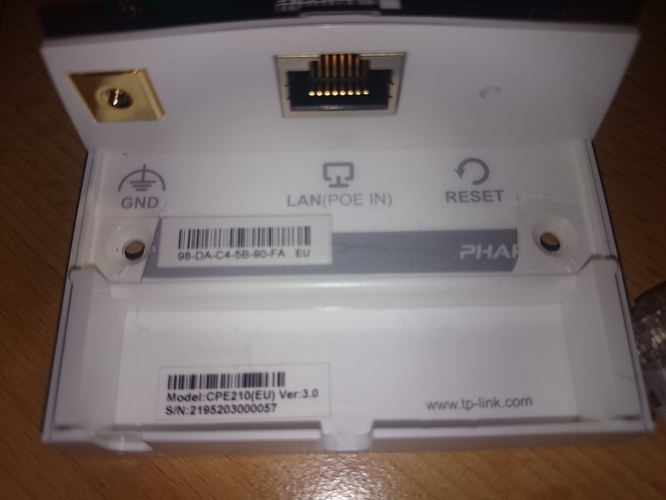Doch.
Wir leben hier auf dem Land wo selbst das 2,4 GHz Netz nicht so ausgelastet ist.
Habe 3 Knoten die teilweise 72 und mehr haben täglich
CPE210 oder eher soetwas wie 841er?
Nee cpe210 … v1.1 und auch 2.0 (jeweils mit 2017.1.5)
Die CPE210v3 hat aber doch wie die V2 und v1 auch 64MB Ram?
Wie willst Du da in das Wifi-Client-Problem geraten? Bislang haben wir das doch nur bei Dual-Radio-Geräten mit 64MB (und single-radio mit 32MB) gesehen.
Hast Du da evtl Auswertungen, die das nahelegen? Immerhin ist das Problem ja auch schon bei Gluon2017.
Ich hab seit mehr als 2 Monaten ein 210 v3 im einsatz.
Ja aber dann hast du die 2018.x Gluon da drauf.
Also OOM-Bug betroffen, sobald eine große Anzahl an Clients Online sind
Ich bei einer CPE210 illusorisch, diese Client-Zahlen zu erreichen.
Bei uns laufen viele Freibäder mit den CPE-Kisten.
Da sind teilweise 50+ keine seltenheit.
Klar, Performance ist dann nicht mehr so doll aber das haben wir auch bei den UBT-Geräten…
Es scheint eine neue V3.0 zu geben, ich habe hier einige Geräte, die nicht so recht starten wollen, obwohl immer noch V3 drauf steht. Ich habe gerade kein Gerät (funktionierendes V3) da um mir die Unterschiede anzusehen, vielleicht kann ja mal jemand ein funktionierenden start log posten, ich hänge den vom „defekten“ an.
start log
U-Boot 1.1.4-g7613bad0-dirty (Jul 20 2017 - 17:08:57)
ap143-2.0 - Honey Bee 2.0
DRAM: 64 MB
Flash Manuf Id 0x1c, DeviceId0 0x70, DeviceId1 0x17
flash size 8MB, sector count = 128
Flash: 8 MB
Using default environment
In: serial
Out: serial
Err: serial
Net: ath_gmac_enet_initialize…
ath_gmac_enet_initialize: reset mask:c02200
Scorpion ---->S27 PHY*
S27 reg init
: cfg1 0x800c0000 cfg2 0x7114
eth0: ba:be:fa:ce:08:41
athrs27_phy_setup ATHR_PHY_CONTROL 4 :1000
athrs27_phy_setup ATHR_PHY_SPEC_STAUS 4 :10
eth0 up
Honey Bee ----> MAC 1 S27 PHY *
S27 reg init
ATHRS27: resetting s27
ATHRS27: s27 reset done
: cfg1 0x800c0000 cfg2 0x7214
eth1: ba:be:fa:ce:08:41
athrs27_phy_setup ATHR_PHY_CONTROL 0 :1000
athrs27_phy_setup ATHR_PHY_SPEC_STAUS 0 :10
athrs27_phy_setup ATHR_PHY_CONTROL 1 :1000
athrs27_phy_setup ATHR_PHY_SPEC_STAUS 1 :10
athrs27_phy_setup ATHR_PHY_CONTROL 2 :1000
athrs27_phy_setup ATHR_PHY_SPEC_STAUS 2 :10
athrs27_phy_setup ATHR_PHY_CONTROL 3 :1000
athrs27_phy_setup ATHR_PHY_SPEC_STAUS 3 :10
eth1 up
eth0, eth1
Setting 0x181162c0 to 0x50a1a100
is button pressed? 0
Autobooting in 1 seconds
Booting image at 9f040000 …
Uncompressing Kernel Image … OK
Starting kernel …
[ 0.000000] Linux version 4.9.182 (mfuhrmeister@3dfx) (gcc version 7.3.0 (OpenWrt GCC 7.3.0 r7794+21-fc1dae5be7) ) #0 Wed Oct 10 18:13:09 2018
[ 0.000000] bootconsole [early0] enabled
[ 0.000000] CPU0 revision is: 00019374 (MIPS 24Kc)
[ 0.000000] SoC: Qualcomm Atheros QCA9533 ver 2 rev 0
[ 0.000000] Determined physical RAM map:
[ 0.000000] memory: 04000000 @ 00000000 (usable)
[ 0.000000] Initrd not found or empty - disabling initrd
[ 0.000000] Primary instruction cache 64kB, VIPT, 4-way, linesize 32 bytes.
[ 0.000000] Primary data cache 32kB, 4-way, VIPT, cache aliases, linesize 32 bytes
[ 0.000000] Zone ranges:
[ 0.000000] Normal [mem 0x0000000000000000-0x0000000003ffffff]
[ 0.000000] Movable zone start for each node
[ 0.000000] Early memory node ranges
[ 0.000000] node 0: [mem 0x0000000000000000-0x0000000003ffffff]
[ 0.000000] Initmem setup node 0 [mem 0x0000000000000000-0x0000000003ffffff]
[ 0.000000] Built 1 zonelists in Zone order, mobility grouping on. Total pages: 16256
[ 0.000000] Kernel command line: board=CPE210V3 mtdparts=spi0.0:128k(u-boot)ro,64k(partition-table)ro,64k(product-info)ro,1792k(kernel),5888k(rootfs),192k(config)ro,64k(ART)ro,7680k@0x40000(firmware) console=ttyS0,115200 rootfstype=squashfs noinitrd
[ 0.000000] PID hash table entries: 256 (order: -2, 1024 bytes)
[ 0.000000] Dentry cache hash table entries: 8192 (order: 3, 32768 bytes)
[ 0.000000] Inode-cache hash table entries: 4096 (order: 2, 16384 bytes)
[ 0.000000] Writing ErrCtl register=00000000
[ 0.000000] Readback ErrCtl register=00000000
[ 0.000000] Memory: 59384K/65536K available (3567K kernel code, 185K rwdata, 888K rodata, 280K init, 212K bss, 6152K reserved, 0K cma-reserved)
[ 0.000000] SLUB: HWalign=32, Order=0-3, MinObjects=0, CPUs=1, Nodes=1
[ 0.000000] NR_IRQS:51
[ 0.000000] Clocks: CPU:650.000MHz, DDR:391.992MHz, AHB:216.666MHz, Ref:25.000MHz
[ 0.000000] clocksource: MIPS: mask: 0xffffffff max_cycles: 0xffffffff, max_idle_ns: 5880801374 ns
[ 0.000009] sched_clock: 32 bits at 325MHz, resolution 3ns, wraps every 6607641598ns
[ 0.008290] Calibrating delay loop… 432.53 BogoMIPS (lpj=2162688)
[ 0.071124] pid_max: default: 32768 minimum: 301
[ 0.076130] Mount-cache hash table entries: 1024 (order: 0, 4096 bytes)
[ 0.083116] Mountpoint-cache hash table entries: 1024 (order: 0, 4096 bytes)
[ 0.094129] clocksource: jiffies: mask: 0xffffffff max_cycles: 0xffffffff, max_idle_ns: 19112604462750000 ns
[ 0.104566] futex hash table entries: 256 (order: -1, 3072 bytes)
[ 0.112611] NET: Registered protocol family 16
[ 0.119267] MIPS: machine is TP-LINK CPE210 v3
[ 0.381929] clocksource: Switched to clocksource MIPS
[ 0.388607] NET: Registered protocol family 2
[ 0.394356] TCP established hash table entries: 1024 (order: 0, 4096 bytes)
[ 0.401726] TCP bind hash table entries: 1024 (order: 0, 4096 bytes)
[ 0.408518] TCP: Hash tables configured (established 1024 bind 1024)
[ 0.415372] UDP hash table entries: 256 (order: 0, 4096 bytes)
[ 0.421556] UDP-Lite hash table entries: 256 (order: 0, 4096 bytes)
[ 0.428493] NET: Registered protocol family 1
[ 0.437844] Crashlog allocated RAM at address 0x3f00000
[ 0.444912] workingset: timestamp_bits=30 max_order=14 bucket_order=0
[ 0.459220] squashfs: version 4.0 (2009/01/31) Phillip Lougher
[ 0.465427] jffs2: version 2.2 (NAND) (SUMMARY) (LZMA) (RTIME) (CMODE_PRIORITY) (c) 2001-2006 Red Hat, Inc.
[ 0.488119] io scheduler noop registered
[ 0.492330] io scheduler deadline registered (default)
[ 0.498257] Serial: 8250/16550 driver, 16 ports, IRQ sharing enabled
[ 0.507988] console [ttyS0] disabled
[ 0.531940] serial8250.0: ttyS0 at MMIO 0x18020000 (irq = 11, base_baud = 1562500) is a 16550A
[ 0.541048] console [ttyS0] enabled
[ 0.541048] console [ttyS0] enabled
[ 0.548610] bootconsole [early0] disabled
[ 0.548610] bootconsole [early0] disabled
[ 0.565106] m25p80 spi0.0: unrecognized JEDEC id bytes: 1c, 70, 17
[ 0.574958] libphy: Fixed MDIO Bus: probed
[ 0.581676] tun: Universal TUN/TAP device driver, 1.6
[ 0.586989] tun: (C) 1999-2004 Max Krasnyansky maxk@qualcomm.com
[ 0.617787] libphy: ag71xx_mdio: probed
[ 1.254900] ag71xx ag71xx.0: connected to PHY at ag71xx-mdio.1:04 [uid=004dd042, driver=Generic PHY]
[ 1.265188] eth0: Atheros AG71xx at 0xb9000000, irq 4, mode:MII
[ 1.272851] nf_conntrack version 0.5.0 (1024 buckets, 4096 max)
[ 1.279256] xt_time: kernel timezone is -0000
[ 1.284382] ip_tables: (C) 2000-2006 Netfilter Core Team
[ 1.290850] NET: Registered protocol family 10
[ 1.300843] ip6_tables: (C) 2000-2006 Netfilter Core Team
[ 1.306834] NET: Registered protocol family 17
[ 1.311492] bridge: filtering via arp/ip/ip6tables is no longer available by default. Update your scripts to load br_netfilter if you need this.
[ 1.324915] Ebtables v2.0 registered
[ 1.329348] 8021q: 802.1Q VLAN Support v1.8
[ 1.335791] hctosys: unable to open rtc device (rtc0)
[ 1.342105] VFS: Cannot open root device „(null)“ or unknown-block(0,0): error -6
[ 1.349843] Please append a correct „root=“ boot option; here are the available partitions:
[ 1.358505] Kernel panic - not syncing: VFS: Unable to mount root fs on unknown-block(0,0)
[ 1.367749] Rebooting in 1 seconds…
geht das etwas konkreter?
Was ist das Symptom? Wo weicht das beobachtete Ergebnis vom Erwartungswert ab?
Nicht mehr „V3.0(EU)“ auf dem Label?
Show pics!
Konkreter siehe start log, aber er findet das root filesystem nicht, das gleiche image funktioniert auf anderen V3.0.
Es steht immer noch V3.0EU drauf.
Hier ein Bild:
Dann hat man wohl mal wieder(!) den Bootloader-Mechanismus getauscht. So wie zwischen der 1.0 und der 1.1.
Das war für TP-Link-Verhältnisse auch schon absurd, dafür dann keine Major-Number hochzuzählen.
Aber wenn die jetzt ohne Versionnummernänderung jetzt UBNT-Methoden anwenden (vom Label ohne Kenntnis der Mac/SN-Kreise gar nix erkennbar):
Versionsbingo next level!
Keine Ahnung, ich besitze nach wie vor kein solches Gerät, daher auch kein Test.
Magst Du evtl mal Freifunk Düsseldorf Flingern Firmware Seite
(respektive Freifunk Düsseldorf Flingern Firmware Seite ) ausprobieren?
Das ist ein gerade frisch gebautes Gluon2018.2.2-21 in der die letzten Patches aus ar71xx-generic: Add support for TP-Link CPE210 V3 (#1696) · freifunk-gluon/gluon@15a9669 · GitHub mit drin sind.

